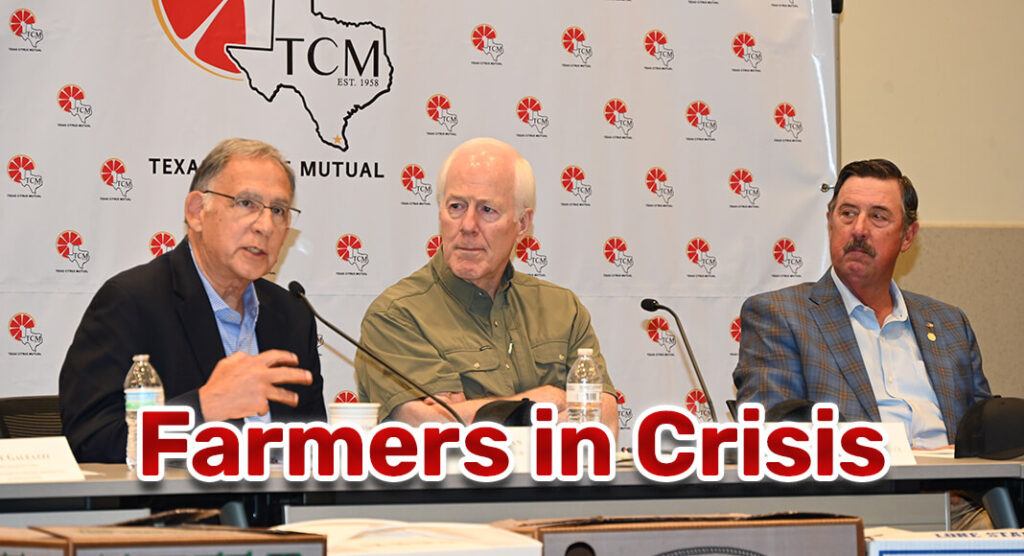
Texas Border Business
By Roberto Hugo González
Today, U.S. Senators John Cornyn (R-TX) and John Boozman (R-AR), the Senate Agriculture Committee’s Ranking Member, held a roundtable discussion with agriculture stakeholders in the Rio Grande Valley to address critical issues impacting local farmers. The discussion focused on the Farm Bill and, more urgently, on Mexico’s reluctance to deliver water to the region as the 1944 Water Treaty required. The water shortage has placed immense pressure on the region’s agricultural sector, threatening the livelihoods of many farmers.
Among the voices heard during this meeting was Brian Jones, a fourth-generation farmer and the State Director of the Texas Farm Bureau for District 13. Jones passionately articulated the dire situation facing the Rio Grande Valley farmers, a region heavily reliant on irrigation for its crops. “My farm is a hundred percent irrigated, or at least it’s supposed to be,” Jones stated. “I just harvested the 38th crop of my career, and never before in those 38 years have I not had irrigation water for my farm.”
Jones clarified that the water shortage is not due to natural factors like rainfall deficiency or drought conditions. Instead, he pointed directly at the failure of Mexico to uphold its water delivery obligations under the 1944 Water Treaty. He criticized the U.S. government for not applying sufficient pressure to ensure compliance. “This isn’t because of a lack of rainfall; it’s not because of drought. This is because Mexico hasn’t delivered the water they owe us, and our U.S. government won’t apply the pressure to make Mexico deliver,” Jones emphasized.
The consequences of this water shortage have been severe for Jones and many other farmers in the region. In anticipation of continuing water scarcity in 2024, Jones has had to make significant changes to his farming operations, including laying off employees and reducing hours for others. He also mentioned using crop insurance to prevent the planting of irrigated cotton on half of his farm. “On the other half, I planted sorghum, which I couldn’t irrigate because I didn’t have any water, nor could I insure it as irrigated because I don’t have any water,” Jones explained.
The impact on crop yields has been devastating. “After all of my years, the irrigated yields go out the window,” he lamented. “The sorghum I harvested was fair, but it was 41% less than my irrigated proven yields.” This significant drop in yield and falling commodity prices have created a “double hit” for farmers in the region. “The sorghum I took through harvest grossed a hundred dollars an acre less than what I’d vetted through my preventive cotton planting. So, I’m just going broke,” Jones shared.
Jones cited a 2023 report from the Texas A&M Center for North American Studies, which projected that losses for 2024 row crops in the Rio Grande Valley could reach $31 million. The report also noted falling commodity prices, with corn dropping by 10% and sorghum by 18% from their five-year averages. When factoring in higher yield losses, the estimated loss for corn and sorghum could be around $25 million, potentially rising to $30 million when using the five-year average prices. These figures do not even include cotton, which is still being harvested, making it difficult to estimate the full extent of the financial damage.
The economic strain on farmers like Jones is palpable. “Personally, I’ll be able to withstand this for a year, but this is not a viable business plan going forward,” Jones admitted. “Unfortunately, many farmers in the Rio Grande Valley can’t withstand these economic pressures this year and are wondering how to pay back this year’s note and get financing for next year.”
According to Jones, the situation has reached a crisis point. “We’re in a crisis; we’re in a disaster, and it’s a disaster being propelled by the U.S. government not standing up for its farmers in the Rio Grande Valley,” he stated bluntly. Jones called for immediate government assistance, including a disaster relief package, an updated Farm Bill with revised reference prices, and crop insurance that accounts for irrigation water shortages beyond farmers’ control.
The consequences of inaction are already visible. “The Rio Grande Valley has already lost its sugar industry,” Jones noted. “It’s losing citrus and vegetable acres daily, and it’s losing farmers as well.” He expressed frustration with the political wrangling in Washington, D.C., which he believes has contributed to the delay in addressing these urgent issues. “Unfortunately, the Farm Bill and the Mexico water debt are political footballs getting tossed back and forth in DC between the two parties,” Jones observed. “And sometimes those in DC forget that the farmers are that football. We’re tired of being tossed and punted and need help now.”
Jones’s impassioned plea at the roundtable underscored the urgency of the situation in the Rio Grande Valley. As farmers face mounting economic pressures and uncertainty about their future, they look to their government for support and action. The roundtable discussion with Senators Cornyn and Boozman was a step towards addressing these concerns, but for Jones and his fellow farmers, concrete measures and timely intervention are needed to prevent further loss and ensure the sustainability of agriculture in the region.
See related stories:














